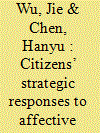|
|
|
Sort Order |
|
|
|
Items / Page
|
|
|
|
|
|
|
| Srl | Item |
| 1 |
ID:
193188


|
|
|
|
|
| Summary/Abstract |
Previous studies on affective governance (情感治理) emphasize how the state has regulated and manipulated citizens’ emotions and psychology. This article, however, shows a different political landscape in which citizens employ emotional strategies to persuade and bargain with the government. Drawing on intensive fieldwork conducted in China from 2019 to 2020, we find that citizens deploy targeted emotional strategies to advance specific interests such as building reciprocal relations with the government, arousing political elites’ empathy, or addressing their most urgent needs. We argue that the government’s deliberate use of affective governance has, on the one hand, unexpectedly revealed and reinforced the conflict between the positive emotions that the state has attempted to exhibit and citizens’ daily experiences and, on the other hand, increased positive feelings towards the government’s efficacy in addressing citizens’ grievances. Taking rare disease patient groups as an example, this article maps and compares three main emotional strategies adopted by civil society in China, namely gratefulness, sadfishing, and dissent. By deciphering these emotional strategies, this article helps us understand the emotional synergy between state and society and sheds new light on the governance of China.
|
|
|
|
|
|
|
|
|
|
|
|
|
|
|
|
| 2 |
ID:
125934


|
|
|
|
|
| Publication |
2013.
|
| Summary/Abstract |
This article offers a reading of the groundbreaking book Bareed Mista3jil: True Stories, a collection of the narratives of Lebanese queers. Here, I argue, a burgeoning collective queer experience is being mapped from the conditions of Western imperialism and globalization, from the legacies of a colonial past, and from everyday life in postwar Lebanon. Resisting the urge to reduce Arab queer identities as either Western or traditionally Arab, the article suggests that though Western constructions of sexualities have certainly been influential, these identities are also responding to the local and cultural context. If we attune our readings to the affects that underlie the stories in this collection, it becomes clear that the emotional strategies to survive and negotiate the difficulties of postcoloniality are different from the strategies of post-Stonewall pride culture. Rather than stifle shame with the insistence of queer pride, this community is creating itself by expressing its suffering from the effects of shame and social humiliation. The narrative thread that comes through is not pride but hope. That is because shame, as Elspeth Probyn contends, gives access to what is most important and, as Eve Sedgwick has argued, is a resource for imagining change.
|
|
|
|
|
|
|
|
|
|
|
|
|
|
|
|
|
|
|
|
|